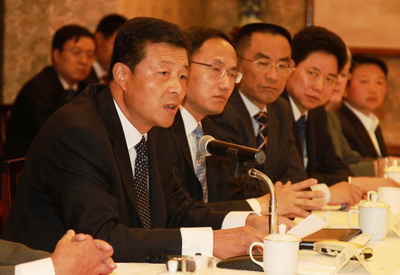|

Opening Remarks
Today we are gathered here to mark the 65th anniversary of the victory in the Chinese people's war of resistance against Japanese aggression and victory in the global fight against Fascism in the Second World War.
The war against Fascism in the 1930s and 40s was fought in over 80 countries and regions across Asia, Europe, Africa and Oceania, affecting 2 billion people, which was unprecedented in human history. China was the main battlefield in the Far East. Its war against Japanese aggression started in September 18th 1931, which was the prelude to the world war against Fascism. Japan's invasion of Beijing on the July 7th 1937 marked the full outbreak of the war against Fascism in the Far East. Since then, the war of resistance in China became the first large-scale battle field against Fascism in the world. Through protracted and bitter struggle,the Chinese people went from defence to counter-offensive and finally won the victory along with progress in the global fight against Fascism. On 2 September 1945, the Japanese government signed the instrument of surrender. Its aggression ended in complete defeat and the world's victory over Fascism was won.
The war in China against Japanese aggression, which started earlier and lasted the longest among the allied countries, was an important part of the world's struggle against Fascism. The Chinese people's victory was not only a major milestone in the liberation of the Chinese nation, but also made major contribution to the victory against Fascism and the maintenance of world peace.
China and Britain were allies during this war. On 15th August, Britain celebrated its 65th Victory over Japan Day, with Prince Charles and Prime Minister Cameron joining hundreds of veterans to remember the 30,000 British soldiers lost in the Far East. Britain offered China valuable support in the form of economic assistance and military cooperation. Through fighting shoulder to shoulder, the Chinese and British peoples forged a profound friendship. Many of their heroic deeds of mutual help and sacrifice were made into films, which helped to keep these historical episodes alive in the hearts of the younger generation.
I am glad to welcome World War II veterans and their family members, and representatives of overseas Chinese community and students in the UK to this round-table today. Regardless of age, nationality, or occupation, I believe all of us can relate to the world's anti-Fascism struggle, each in our own way. I look forward to this exchange with you to reflect on this unforgettable part of history so that we better grasp today and open up the future.
Thank you.
* * * * *
Closing Remarks
Thank you very much for your contributions to our discussion. I am deeply impressed by your personal accounts, comments and reflections. I would like to sum up by way of the following four points:
First, the war against Japanese aggression was a national liberation war, in which the first complete victory over foreign aggressors in the modern history of China was won. It was an important milestone in the 20th century that has left a far-reaching impact on the development of the Chinese nation and of world civilization in general.
Secondly, China's victory over Japanese aggression was made possible in part by the support of peace-loving nations and peoples including Britain, international organizations and other anti-Fascist forces. As an old Chinese saying goes, "A just cause enjoys abundant support, while an unjust one receives little''. That is why Fascism was destined to fail wherever it occurred. History proves to us once and again that good eventually prevails over evil, light over darkness, and progress over the reactionary force.
Thirdly, China-Britain friendship forged during the war should not be forgotten. That is exactly why we are holding this round-table to learn lessons from the past and to pass on this legacy of friendship to the next generation. This will help our two peoples to understand each other better and will further strengthen our comprehensive strategic partnership. I am confident that as we work together, China-UK relations will continue to grow to the benefit of our two peoples.
Fourthly, looking back on history will help us to better grasp today and open up the future. The two world wars in the 20th centuries have inflicted untold suffering on people all over the world. Even today, wars and conflicts still rage on in some parts of the world. As countries of major influence, China and Britain should work with the rest of the world to safeguard stability and prevent war, promote cooperation of mutual benefit and work together for a peaceful, prosperous and harmonious world.
Thank you.
|

